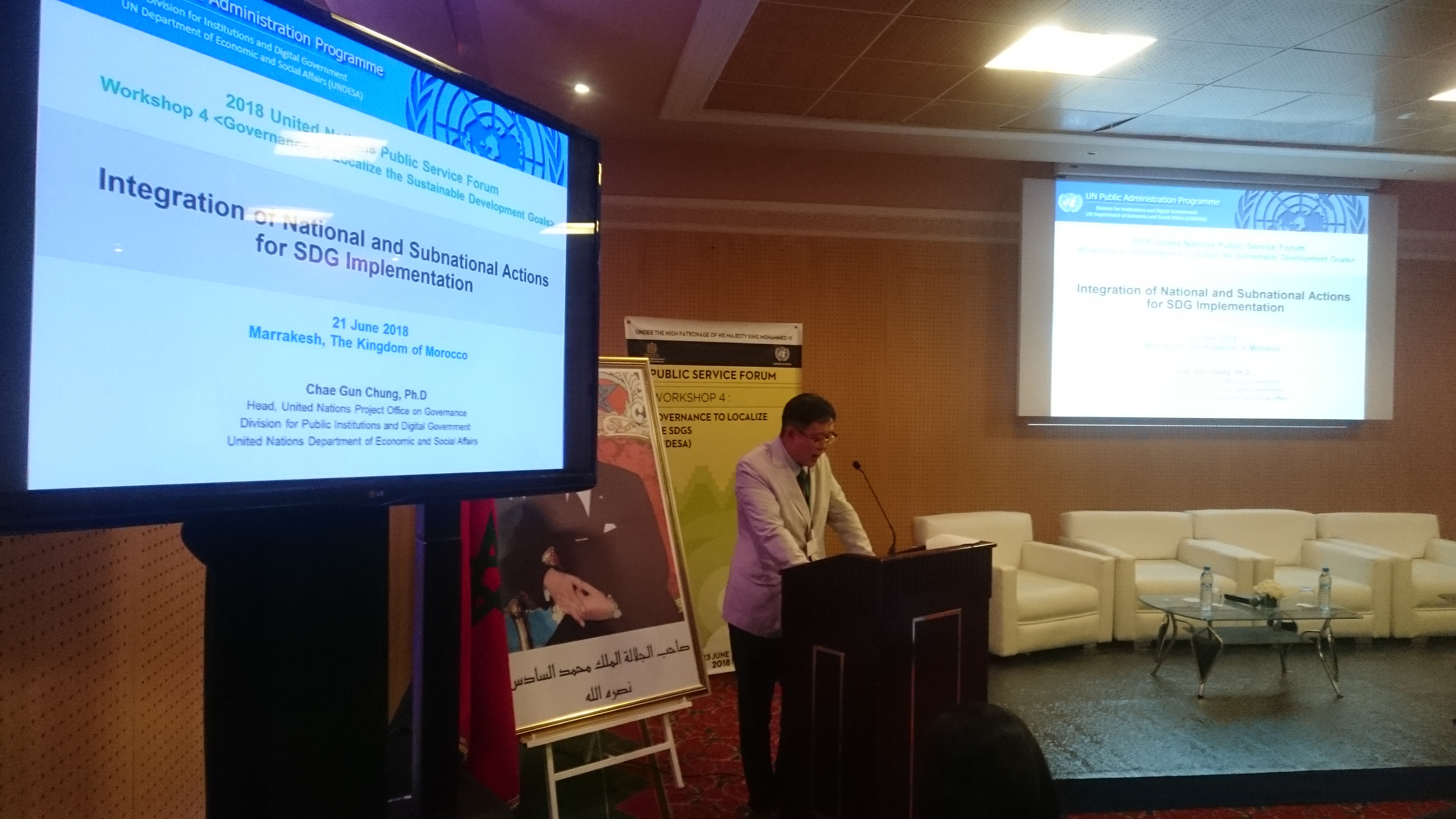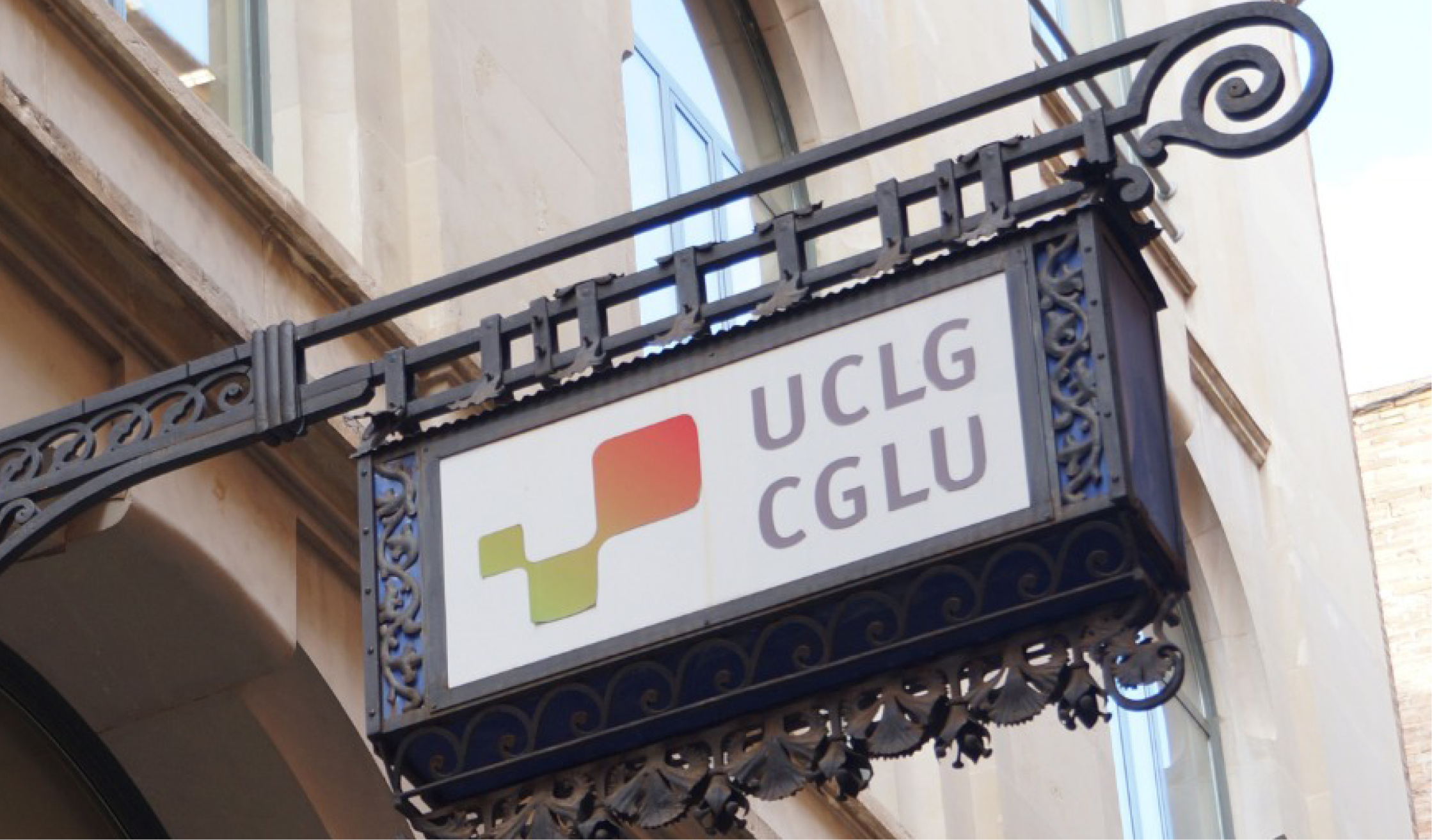2018 United Nations Public Services Forum: Local and Regional Governments at the heart of the debate
28.06.2018
UCLG and its Africa section organize a learning event on localizing with UN DESA and a debate on transparency. The 2018 UN Public Service Forum, organized by the Government of the Kingdom of Morocco and the United Nations Department of Economic and Social Affairs (UN DESA), focused on “Transforming Governance to Realize the Sustainable Development Goals”. The event held from 21-23 June in Marrakesh, Morocco, was an opportunity to highlight the pivotal role that public services play in the implementation of the Sustainable Development Goals (SDGs).
In the frame of this forum, UCLG, together with UCLG-Africa and UN DESA (through its Division for Public Institutions and Digital Governments – DPIDG and the program UNPOP) co-organized workshop 4 on Governance to localize the Sustainable Development Goals.
The objective of the workshop was to address current challenges in localizing the SDGs and to discuss how to build capacities for effective decentralized governance to realize the 2030 Agenda. Participants from ministries, UN agencies, networks and academies from all regions enabled a very interesting exchange around governance, challenges and practices in localization.
The workshop was structured around three main axes:
1- Cooperation between National & Local Institutions in Localizing the SDGs
2- Addressing National & Local Gaps – Tackling Capacity, Information & Resource Gaps
3- Promoting Whole-of-Government & Whole-of-Society Approaches for Effective Multi-Stakeholder Partnerships
 Local and regional authorities were present in all sessions through local elected representatives, national associations (CNM Brazil) and international networks (UCLG, UCLGA, WEGO), while a mayors’ roundtable also provided an opportunity to present local visions and capacity needs in the implementation of the SDGs at their level. In particular, we can mention the participation of the mayors and deputy mayors of: Libreville (Gabon), Cotonou (Benin), Livingstone (Zambia), Asira El-Shamalia (Palestine), Amman (Jordan), Independencia (Chili), Prix (Thailand), Qrandi (Malta), and Marrakesh and Mdilet (Morocco).
Local and regional authorities were present in all sessions through local elected representatives, national associations (CNM Brazil) and international networks (UCLG, UCLGA, WEGO), while a mayors’ roundtable also provided an opportunity to present local visions and capacity needs in the implementation of the SDGs at their level. In particular, we can mention the participation of the mayors and deputy mayors of: Libreville (Gabon), Cotonou (Benin), Livingstone (Zambia), Asira El-Shamalia (Palestine), Amman (Jordan), Independencia (Chili), Prix (Thailand), Qrandi (Malta), and Marrakesh and Mdilet (Morocco).
Further, the closing remarks were given by Jean-Pierre Elong Mbassi, Secretary General of UCLG-Africa together with Chae Gun Chung Head, United Nations Project Office on Governance (UNPOG) under UN DESA.
The main outcomes of the discussion highlighted that the SDGs are local and that Local and Regional Authorities did not wait for national governments to act, rather, they are already acting on the SDG agenda (for example, on climate change – SDG13, gender equity – SDG5, and health & wellbeing -SDG3, among others).
 The SDGs are local. Nonetheless, as SDGs also require an important coordination effort at all levels, in particular when thinking in the medium long term, specific needs have been identified, such as: financial support; mechanisms to support and work with civil society & stakeholder engagement in SDGs and learning; capacity building, and international cooperation and exchange on this field.
The SDGs are local. Nonetheless, as SDGs also require an important coordination effort at all levels, in particular when thinking in the medium long term, specific needs have been identified, such as: financial support; mechanisms to support and work with civil society & stakeholder engagement in SDGs and learning; capacity building, and international cooperation and exchange on this field.
Specific emphasis was given to the importance of the “whole-of-governance” approach and decentralization to increase equity, accountability and transparency, being part of the policy setting, implementation, monitoring and evaluation of SDG implementation.
In other words, the SDGs require political will, a strong legal basis and good capacities, tools and strategy. In this sense, the umbrella of international networks of Local and regional authorities have been appointed as key to rolling out the SDGs, in particular to strengthening capacity building of local government officials, as well as increasing collaboration between the central, local and regional levels.
Award for Innovation and Excellence in Public Service
On the occasion of the UN Public Service Day, eight public institutions received awards for their public service innovation and excellence in contributing to the achievement of the Sustainable Development Goals and to leaving no one behind. Most of the winners of 2018 fell into 3 categories: (1) Reaching the poorest and most vulnerable through inclusive services and partnerships; (2) Making institutions inclusive and ensuring participation in decision-making; (3) Promoting gender-responsive public services to achieve the SDGs.
The awarded cases are mainly linked to services provided at local or regional level:
1- Indonesia Bituni district on Malaria reduction and prevention (EDAT) (Indonesia)
2- Job opportunities regional government of Styria (Austria)
3- Innovative Tax collection Provincial government of Chungcheongnam-do Province (South-Corea)
4- City of Manizales, Colombia: change your mind, build peace
5- City of Madrid on citizen participation
6- Government of Kenya in 47 counties promoting gender-responsive public services
7- Roi Et Provincial Health Office, Thailand: integrated approach of cervical cancer control
8- Government of Switzerland: Switzerland Advancing Gender Equal Pay SAGE
More information on the awarded initiatives here.